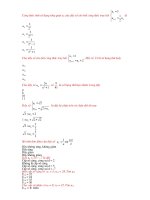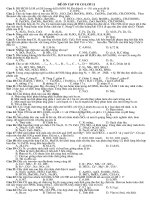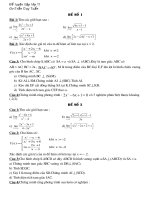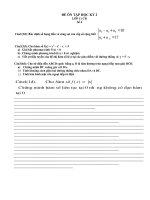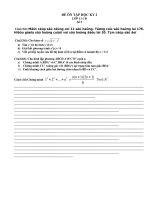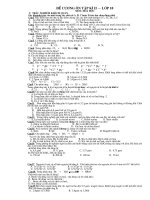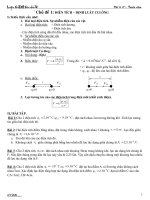on tap U1 & 2 lop 11
Bạn đang xem bản rút gọn của tài liệu. Xem và tải ngay bản đầy đủ của tài liệu tại đây (40.32 KB, 3 trang )
Revision 2
I. Pick out the word whose underlined part is pronounced differently from that of
the rest.
1. A. bank B. any C. now D. money
2. A. think B. blanket C. hungry D. snow
3. A. involve B. autumn C. native D. glance
4. A. finger B. English C. solemn D. thing
5. A. analyze B. wrong C. energy D. ignorant
6. A. young B. long C. seven D. sing
7. A. weight B. height C. eight D. vein
8. A. too B. food C. soon D. good
II. Complete the sentences with the appropriate forms of the words in the
brackets.
1. Does television have an effect on children s ..? (behave)’ ………………
2. The play was .bad. (embarrass)……………
3. I ve never felt so ..in my life. (embarrass)’ ………………
4. All the students were in making costumes. (involve)…………
5. She was .ill, so she didn t go to school yesterday. (serious)………… ’
6. Don t put too much in what the papers say. (confident)’ ……………
III. Complete the sentences by putting the verbs in brackets into simple past or
the past continuous.
1. It (snow) ..when I (leave) ..home this morning.…………… …………
2. A lot of people (wait) .for the 7.30 bus last night.…………
3. He (talk) on the phone when I (arrive) …………… ……………
4. I nearly had an accident this morning. A car (come) .towards me, but I…………
(move) quickly out of the way.…………
5. It was a sunny afternoon and people (sit) on the grass in the park. Then it…………
suddenly (start) .to rain.………………
6. Which hotel (you/ stay) .in when you (lose) ..your passport?…………… …………
7. Fortunately, I (not drive) ..too fast when the child (walk) into the………… ……………
road in front of me.
8. What (you/ do) ..at 3.00 yesterday afternoon?…………
IV. Complete the sentences by putting the verbs in brackets into the simple past
or past perfect.
1. I (not watch) the film because I (see) it before.…………… ……………
2. When I (get) .home, I (switch) ..on the answer phone. Several…………… ……………
people (leave) .me some message.……………
3. I (not hear) ..the joke before. I (laugh) .a lot.…………… ……………
4. When we (come) .out of the restaurant, we saw that our car (disappear) ..…… ……
5. She couldn t see the photograph very well because she (not bring) ...her glasses’ …
6. When we (finish) our meal, we (go) .for a walk.………… …………
7. After I (finish) .work, I (watch) .TV………… ……………
8. By the time he (be) .twenty-five, he (make) ..a million pounds.………… …………
V. Rewrite the following sentences, beginning as shown, so that the meaning
stays the same.
1. She has studied Japanese for 5 years.
She began ...................................................................................................................
2. I haven t heard from them for ages.’
It s ages ’ .......................................................................................................................
1
3. How long have they got engaged?
When ...........................................................................................................................?
4. Oil was slowly covering the sand of the beach.
The sand ......................................................................................................................
5. He started investigating the case a week ago.
He has .........................................................................................................................
6. Mary made a sandwich and then sat on the sofa to watch TV.
Before Mary .................................................................................................................
7. He did all the work and then he went home.
After he ........................................................................................................................
8. During lunch, some one rang the belt.
While I ..........................................................................................................................
VI. Read the passage and then do the task that follow.
When I was young, I argued with my brother and my sisters all the time. I used to share
most of my toys with my brother, but he specialized in keeping them for himself. When I
asked him for anything he simply used to refuse to give it to me, and then I became
very angry with him. Our sisters blamed everything on us when our parents accused us
of quarrelling all the time. My brother and I got annoyed about this, but only succeeded
in making matters worse. Our parents didn t approve of our quarrelling so much, and’
insisted on not taking sides. They either laughed about it, or told us to forgive each
other for everything. Soon, we became good at getting on well with each other.
A. Read the statements and decide whether they are true or false, based on the
passage.
1. When young, the author always got on well with his brother and sisters ........
2. His brother never shared anything with him ........
3. His sisters always took sides with him ........
4. His parents disapproved of his quarrelling with his brother and sisters ........
5. His parents showed them how to get on well with each other ........
B. Answer the following questions.
1. What did the author use to share with his brother?
.....................................................................................................................................
2. Why did he become angry with his brother?
.....................................................................................................................................
3. What did his sister often do when their parents accused them of quarrelling all the
time?
.....................................................................................................................................
4.Did his parents take sides with either of them?
.....................................................................................................................................
5. What did their parents do to make them to get on well with each other?
.....................................................................................................................................
VII. Choose the best answer for each of the following sentences.
1. Andrew .................... the test before so he...................... it very easy.
A. did/ had found B. had done/ found C. was doing/ found D. did/ was founding
2. You ...................... your new hat when I ...................... you yesterday.
A. were wearing/ had met B. wore/ had met
C. wore/ was meeting D. were wearing/ met
3. As I .................... the glass, it suddenly ...................... into two pieces.
A. cut/ broke B. was cutting/ broke
C. cut/ was breaking D. was cutting/ had broken
2
4. John had agreed ......................... me in his office.
A. to meet B. meeting C. to be met D. being met
5. The man wanted to avoid ...................... on security cameras.
A. to see B. seeing C. to be seen D. being seen
6. Peter ........................ to go in for the exam.
A. avoided B. let C. advised D. decided
7. I tried ........................... the bus, but I missed it.
A. to catch B. catching C. to be caught D. being caught
8. The children seem to be totally .......................... of working quietly by themselves.
A. unable B. impossible C. incapable D. not able
VIII. Put these words in correct order to make meaningful sentences.
1) tell/ have/ news/ We/ to/ not/ got/ any/ you
->............................................... .. ..................................
2) to/ 8.00/ for/ It s/ be/ before/ impossible/ me/ there’
->............................................... .. .......................................
3) man/ through/ window/ 5/ I/ minutes/ jump/ the/ saw a/ ago
->............................................... .. ...........................................
4) me/ to/ with/ in/They/Florida/ invited/ stay/them
->.........................................................................................
5) hair/ friend/ My/ has/face/ and/ black/ an/oval
->............................................................................................
6) to/ play/ five/ He/ piano/ started/ the/ years/ ago
->............................................... .. ........................................
7) he/ was/ not/ hungry/ all/ had/ day/ Tim/ because/ eaten
->............................................... .. ..................................
8) letter/ the/ ,/ opening/ the/was/ telephone/ I/ rang/ While
->............................................... .........................................
9) the/ during/ quite/ Britain/ much/ winter/ It/ snows/ in
->............................................... .. .......................................
10) seen/ were/ the/ ever/They/ poorest/ people/ I/ had/
->................................................. ...................................................
3
